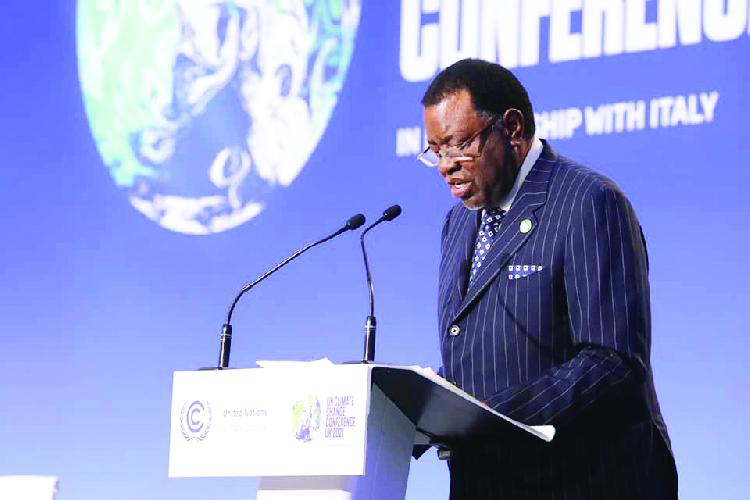Africa-Press – Namibia. PRESIDENT Hage Geingob says Namibia supports the call of United Nations secretary general António Guterres for the world to phase out the use of coal.
Geingob said this at the high-level segment of the 26th Conference of the Parties to the United Nations Climate Change Conference (COP 26), which ended in Glasgow, Scotland, last week.
He said Namibia would contribute to this call by significantly upscaling the use of solar and wind energy to support local demand, and encouraging its fellow Southern African Development Community (SADC) member states in the Southern African Power Pool to phase out the use of coal.
Namibia has come up with initiatives for a green and blue economy, which are part of the Harambee Prosperity Plan and Vision 2030, while the country has also signed a deal with an investor for the setting up of a green hydrogen plant on a 5 700 square kilometre piece of land in southern Namibia.
These initiatives, according to Geingob, are supported by political will. “We are taking these bold steps to enhance our energy security and build a resilient economy,” he said.
In March this year, Guterres appealed to the wealthy nations of the world to phase out the use of coal by 2030 so that the world can meet the target of keeping global climate warming below 1,5 degrees Celsius.
At the time, Guterres said: “Phasing out coal from the electricity sector is the single most important step to set in line with the 1,5 degree goal.” Geingob was one of the heads of state who attended the conference, which started on 31 October and concluded on 12 November.
At the conference, more than 40 countries, including major coal-dependent nations such as Poland, Vietnam, and Chile, have pledged to phase out the use of coal.
Signatories to the agreement have committed to ending all investment in new coal power generation domestically and internationally. They have also agreed to phase coal power out into the 2030s for major economies and the 2040s for poorer nations.
Geingob said Namibia is experiencing severe droughts and devastating veld fires, which have negatively impacted agriculture, and human health and well-being.
Due to its arid and semi-arid environment and its over-dependence on rain-fed agriculture, Namibia is highly vulnerable to the negative impacts of climate change.
Geingob said Namibia would like to see climate finance to be provided in the form of grants rather than loans to help emerging economies not to be burdened by debt.
He said the world needs to work together in the fight against climate change, and COP26 is the most important platform for entering agreements to address the calamity that will affect all people.
For More News And Analysis About Namibia Follow Africa-Press






